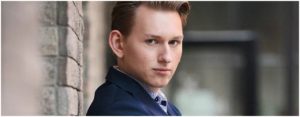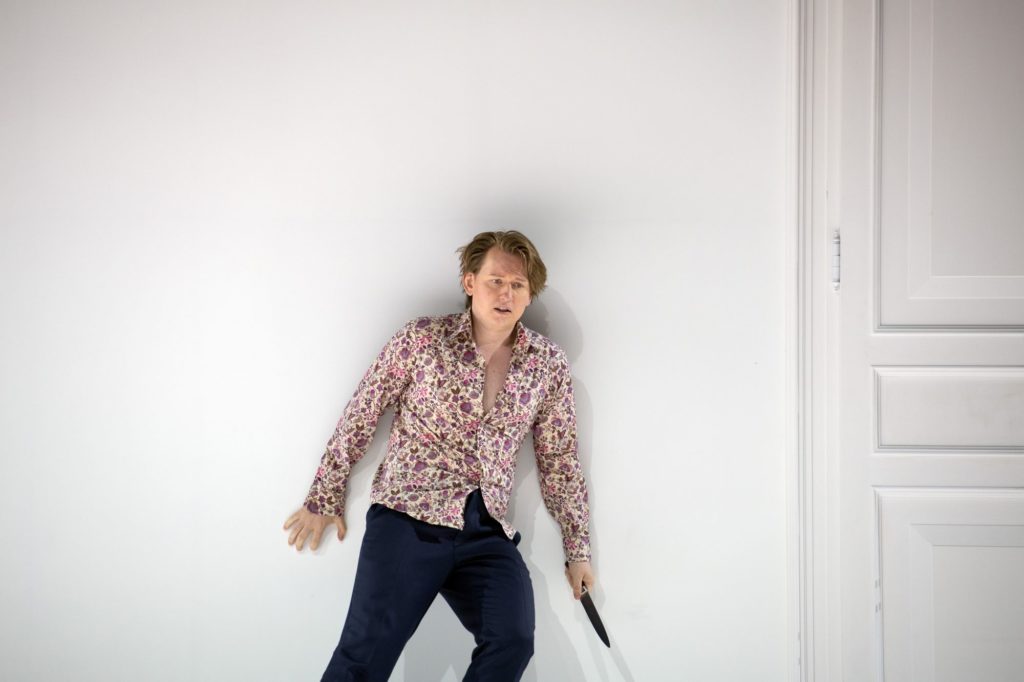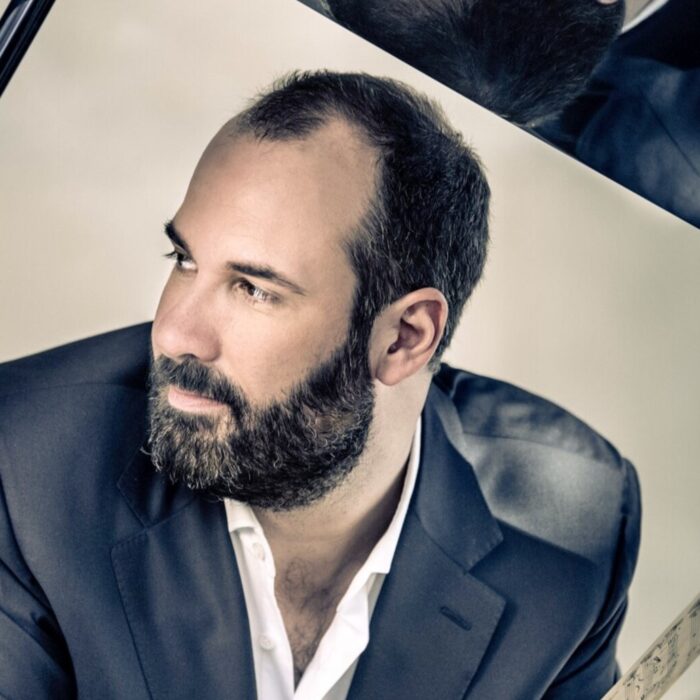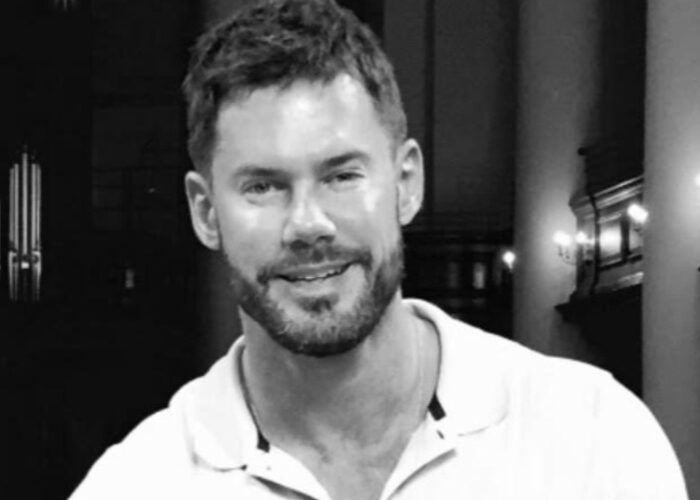
Q & A: Tenor Bogdan Volkov on Making his ‘Unexpected’ Debut at the Salzburg Festival
By Ona Jarmalavičiūtė(Credit: Kristina Kalinina)
Among the many performers at this year’s unique Salzburg Festival is tenor Bogdan Volkov. A former student at the Glier Kiev Institute of Music and Tchaikovsky Kiev National Academy of Music, and a frequent performer at Bolshoi Theater in Moscow, Volkov is making his debut with the festival as a part of this year’s production of “Così fan tutte.”
But his debut almost didn’t happen at all.
Volkov was set to debut at the Festival this year in “Boris Godunov.” However, due to the spread of COVID-19, the production was canceled. When the Salzburg Festival vacillated for weeks about how it would manage its 2020 edition, it seemed that Volkov’s debut might not happen after all.
And then the company announced its new productions, one of which included an opportunity for the young tenor.
Volkov, who has toured throughout Austria, Switzerland, France, Hong Kong Arts Festival, and Lincoln Center Festival, recently spoke to opera about his unexpected opportunity at Salzburg, the lifestyle of an opera singer in light of COVID-19, and the spirituality he finds on stage.
OperaWire: There was a long period of ambiguity about whether the Salzburg Festival will happen this year. Your opera “Boris Godunov” was canceled, but now you still are performing in Salzburg this year.
Bogdan Volkov: I was supposed to sing my debut in the festival as Simpleton in “Boris Godunov,” but unfortunately it was canceled this year.
Surprisingly, instead of other operas, a new creative decision was made and the director Christof Loy was invited to stage W. A. Mozart’s “Così Fan Tutte.” I was happy to be asked to still perform at the festival again even with another role. On the other hand, I feel the responsibility of be singing Mozart here. Even though I have performed this role many times and I have also previously worked with Christof Loy, the pressure is really high. The time and occasion are also very special in different ways. This is one of the only teams staging opera during the pandemic and also this is the 100th anniversary of the festival.
I feel that I don’t even realize completely what I am experiencing at this moment, but hopefully, it will come later.
OW: Was it unexpected to be offered the role?
BV: Yes, it was. I had many cancelations this year – “The Love for Three Oranges,” “Falstaff,” and “Boris Godunov.” Just recently my agent broke the news to me about the cancelation of the Salzburg festival opera, but that they wanted me in “Così Fan Tutte.” Of course, I felt confused, but very excited too. It was difficult to leave Moscow in quarantine; I had a few flight cancelations. The journey was very stressful. Fortunately, the administration of Salzburg’s festival helped me and even though two days later than planned, I came here!
OW: What has the rehearsal process been like? Are there any differences in rehearsals due to the COVID-19 restrictions?
BV: We work as before, but we are very disciplined in between the rehearsals. People are separated into a few groups – singers and musicians work in the most dangerous conditions, rehearsing with no masks and no distance between each other. That‘s why we are tested every 10 days. Of course, afterward, we wear masks and have special badges that note our group. Also, we have to note all of our contacts outside the festival and this city in the summer is crowded with tourists in the streets, cafes, restaurants.
So it takes discipline to reduce contacts and avoid crowded places. Even though it could be called an experiment, this is a very detailed and responsible system. That’s why, despite all of it, I am happy to be a part of one of the few opera teams in the world that can work and rehearse now.
OW: Would you say that all this has changed the rehearsal process – creative decisions or the energy in the room?
BV: In fact, everything is the same as before. Just before going on stage to rehearse we practice social distancing. During the rehearsal, we are the same alive people working together as we did before the quarantine. Now I have realized how much I have missed it during the past few months.
OW: Did you do any projects during the quarantine as an opera singer?
BV: The situation was sad and scary, and it was really difficult to deal with all the uncertainty about the future. Actually I was preparing for the worst – that I will have no work projects for the entire year. But of course, it is impossible for people to go for a year without any music. Throughout history, music always helped people to go through difficult circumstances – even war. During the quarantine, I made a decision not to sing – relax and take every day as it is. It was a great experience and my voice could rest, the muscles relaxed – now when singing I feel fresh. And even if there wouldn’t be any opera performances until the end of the year, there will be recitals and chamber music. One way or the other music will find its way to the listener.
OW: How does your future look like in these uncertain times?
BV: I have a work schedule filled for five years now, but the rest of this year and even next year’s plans will probably change. But sooner or later things will come back to normal.
I am happy to now be working in Salzburg and then try to go stage “Eugene Onegin” and the new Onegin will be Andre Schuen, who is Guglielmo in Salzburg’s “Così Fan Tutte.” So it’s nice that we have an opportunity to meet now and then continue working together.
And my last project was also “Eugene Onegin” in Oslo, staged by Christof Loy himself. So this happened to be a beautiful chain of connections this year. Also, it is great to have work projects in Austria, where the virus threat is smaller than in other countries. So, of course, I have many professional plans of my own, but this year nobody really knows what is going to happen tomorrow.
OW: This is your first time in Salzburg. Has anything surprised you about the city and the festival?
BV: I didn’t have a lot of time to get to know the city well, but I remember that the first time in Salzburg I went to the birth house of Mozart. It was very inspiring! And I am happy to be singing Mozart in the place that he was born. Also when I look through the window in my apartment, I see the monument of Mozart, glaring right at me.
So it is a great place to sing Mozart, because the inspiration is all around you. I think the organizers have chosen the right program for the festival because the most important composers are Strauss and Mozart.
OW: What do you expect from the performances with all the restrictions?
BV: The auditorium is very huge and impressive, I am happy to work there. But I don’t know what to expect from the performance with less audience. Of course, many times I had dress rehearsals, when you sing for fewer people, but never for a half-empty house.
On the other hand, I believe that the audience this year will be very special. People will be intelligent for their devotion to music and brave for taking a risk and going to see the performance. I hope that the connection to the listener will be even more powerful in such conditions.
OW: Can a smaller audience affect acoustics in a way?
BV: Usually, when it is full house, the sound is a little bit drier. Mozart’s opera is very soft and concentrated in details. Everybody says that the acoustics in the hall are amazing, so I think the smaller audience will not make a big difference.

(Credit: Monika Ritterhaus)
OW: How much creative power do you have in the decision making of interpretation?
BV: Before starting to stage a scene, we are just singing it. Then the discussions with the conductor and stage director take place. Christof Loy tells us his idea for the scene and we phrase music according to the intention and meaning he provides. Afterward, we try to find style, taste, and intonation in our performance. When staging we add body language and with it, new colors in the voice appear. I am looking forward to it.
OW: How would you describe the process of working with director Christof Loy?
BV: It is also important for me to gain as much experience from the production and director, as it is possible. And I feel that Christof Loy and I had established a connection already. I trust him completely and I understand what he wants. I would say he is very pleasant to work with! With such a connection the performances become more intimate, vulnerable, and tender. For me, it is important that the atmosphere and the relationships would be beautiful as well as powerful.
OW: What is expected from the singer during the rehearsing process?
BV: The most important thing is to be open and honest, to trust the director and, of course, to love music. Through this love, you will connect with people on stage and in the audience. Usually, you don‘t know how anything will turn out, but you know that in the end, you will stand on stage holding hands with other people. Then you have to rehearse with closed eyes, but an open heart. And sometimes it‘s not the final result, which is the most important – the process is rewarding itself.
OW: Did you have an image of what the singer’s career should be at the beginning? How does reality differ?
BV: Reality is always different from any dream, that’s why I prefer to enjoy reality. I could never dream and expect all the magical things that have happened for me. I would say that the profession of the opera singer is full of stress. It takes a lot of energy and effort. It is always a difficult process to learn new repertoire, for example, 20th-century music. Mozart is also challenging because his music is filled with details.
And I think I wasn’t thinking about these elements when I was dreaming about my career in opera. When starting the career I guess I just imagined myself standing on stage and singing. There were no fantasies about flights, tickets, language barriers. But in some way, I was not wrong since the main thing in this profession is singing and going deep into opera through music and drama as art. I became an opera artist, not because I wanted to have a career, but because I love to sing music. It is my life and I can’t imagine living without music being a part of it.
OW: What helps you to deal with other parts of everyday life, that are not so inspiring?
BV: Nothing helps, I am always stressed and I don’t know how to deal with it. But all things that make me nervous end well. So for me, it is important to have hope and believe in my possibilities. I am still taking the risks and going on adventures, even though I get nervous.
Also, it is very important that opera companies and theaters would help musicians during difficult times. Because I believe that without support from the government, I wouldn’t even be here. Art and culture are dependent on governments in many countries. And I am grateful for this situation – all the help and support that I have received. It’s not an accident to meet people you were meant to meet and to receive their help. There are people with noble hearts everywhere.
OW: What is it like to perform for other people? Would you say there is something that you would like them to experience?
BV: It comes down to the listener itself. People that come to the theater usually love opera and so they are open to what is happening on stage. So a kind of energy conversation happens with everyone in the room. You can feel such moments when you perform ensembles with other singers. I adore Mozart’s opera ensembles, they are so beautiful. At these moments time stops and everybody in the hall touches this energy. I think the most important quality of Mozart’s music is that centuries ago he wrote down his feelings and today everyone in the room feels as he did. This confirms the timelessness and genius of Mozart.
OW: Do you have singers that you admire the most?
BV: First among all of them is Maria Callas. And not even because of her voice, even though we can recognize her from first notes, but with that voice, she could bring people to other dimensions. I get the same feeling when I am listening to Nicolai Gedda singing chamber music. I think for a singer it is important to be intelligent and have a message for whoever is ready to listen to you. Just expressing music and inviting the audience to be a part of these spiritual moments. I find that very inspiring.
OW: What are your hopes for the future?
BV: I am waiting for the next season hoping it will be as before. I hope the situation in Europe and in Austria will stay calm and that Russia will recover and the theater will be open again. A lot of people in Moscow are waiting to go to the theaters and listening to music live. I am sure sooner or later everything will be fine because one cannot imagine life without theater, music, and people.


